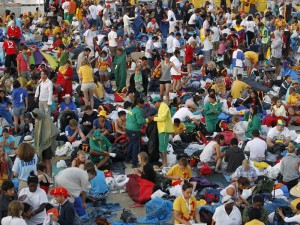CBCP to World Youth Day ‘TNTs’: Go home

WHERE ARE THE FILIPINOS? In this Associated Press file photo, worshippers wake up at the Cuatro Vientos airfield, outside Madrid, waiting for the arrival of Pope Benedict XVI to celebrate mass Sunday Aug. 21, 2011. The Pope went to Madrid for a four-day visit to celebrate the church's World Youth Day. (AP Photo/Armando Franca)
Sin no more by not going TNT. In other words, please come home.
An official of the Catholic Bishops Conference of the Philippines (CBCP) on Tuesday appealed to Filipino delegates who attended the recent World Youth Day in Madrid, Spain, and who are still in Europe to make sure they return home and not turn into undocumented or illegal immigrants.
TNT (tago ng tago—or always in hiding) is a local term that refers to Filipinos who stay overseas without proper documentation and keep hiding from authorities to avoid deportation.
Fr. Conegondo Garganta, executive secretary of the CBCP Episcopal Commission on the Youth, warned that the trust the Spanish government had in the Philippine Catholic Church when they issued visas for the Filipinos would be damaged if they did not come home.
The World Youth Day festival held last week was graced by the presence of Pope Benedict XVI. Addressing the 1.5 million young people who attended the closing day, the Pontiff urged them to become missionaries for the faith, to “share with others the joy of your faith.”
Article continues after this advertisement1,500 not yet home
Article continues after this advertisementGarganta said that, so far, “70 percent” of the 427 delegates who attended the youth festival under the aegis of the commission had returned to Manila and the commission was still trying to account for the rest.
About 1,500 other Filipinos attended the festival with their own groups, he said.
“They should come back and be thankful that they were able to attend the 26th World Youth Day in Spain,” Garganta said at a Church-organized, weekly media forum at Ilustrado Restaurant in Intramuros, Manila.
“They should bring home what they learned. They could share many things with those waiting for them,” he said.
Lesson from past
If they do not return, one consequence is that it might hurt the local Church’s relations with the Spanish embassy in Manila, Garganta said. “It would be our image that would be damaged,” he added.
During the World Youth Day celebrations held in Germany in 2005 and in Canada in 2002, some Filipino delegates did not return home.
However, Garganta emphasized it was still too early to say if any Filipino delegate had jumped ship because the Schengen visa the Spanish embassy had given them would expire only by mid-September.
“Only when that happens can we see the number of those who returned and remained true to our agreement that this is a spiritual and church activity and that they should return to the Philippines,” Garganta said.
Delegates screened
He said the commission had subgroup leaders of priests and nuns to make sure the delegates came back. The local dioceses also screened the delegates before they were allowed to go to Madrid.
The delegates were 15 to 30 years old and were accompanied by older people who acted as guides and coordinators, Garganta said.
He said that even before releasing the delegates’ visas, the Spanish embassy had asked the commission how many it expected would not return.
“How many percent do you think will stay?” Garganta quoted embassy officials as saying.
“Ideally, we do not want to put a number because we promised that this is a Church event (but) based on past experience, one percent,” Garganta said.
Garganta said the embassy gave a bigger estimate.
Too many oldies
Delegate Jandel Posion said the Spanish government even barred some delegates from Africa and South Asia out of fear that they would not go back to their countries.
As for the World Youth Day event itself, Posion said it challenged him to be firm in his faith after discovering that most of those who went to church in Spain were “oldies” and women.
He said he met one Spanish protester who cursed the delegates and the Pope.
“Every day, I was reminded to nourish my faith. When we arrived, those who greeted us were older persons. Why was there no youth among them? This was the country that gave us Christianity. What happened?” Posion said.
“The youth we met in the parish we visited were the two altar boys who were aged 20 and 21. We were expecting the youth but we met oldies and seniors. The youth were out in the bars at 11 p.m.,” he said.